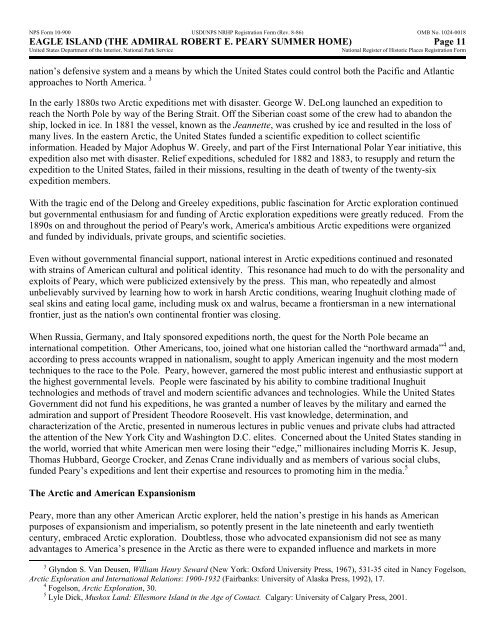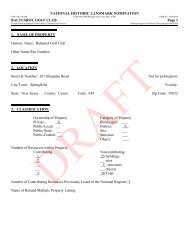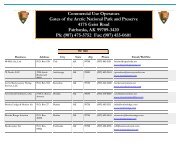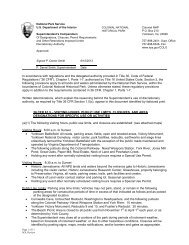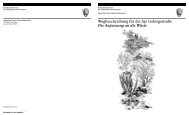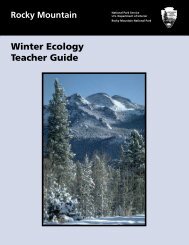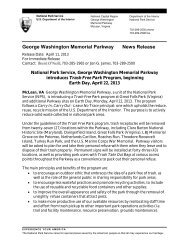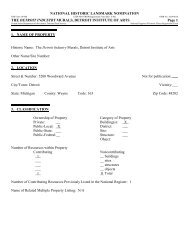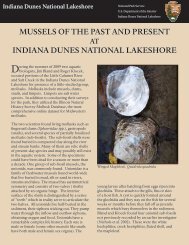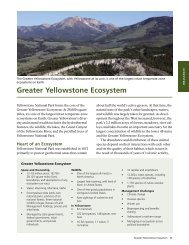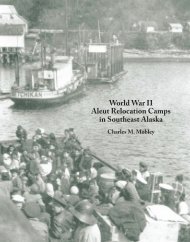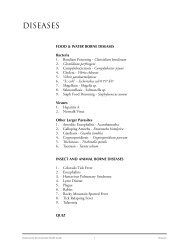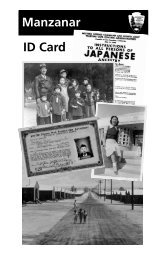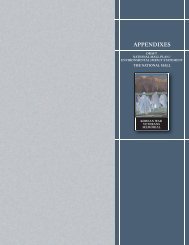Nomination - National Park Service
Nomination - National Park Service
Nomination - National Park Service
Create successful ePaper yourself
Turn your PDF publications into a flip-book with our unique Google optimized e-Paper software.
NPS Form 10-900 USDI/NPS NRHP Registration Form (Rev. 8-86) OMB No. 1024-0018<br />
EAGLE ISLAND (THE ADMIRAL ROBERT E. PEARY SUMMER HOME) Page 11<br />
United States Department of the Interior, <strong>National</strong> <strong>Park</strong> <strong>Service</strong><br />
<strong>National</strong> Register of Historic Places Registration Form<br />
nation’s defensive system and a means by which the United States could control both the Pacific and Atlantic<br />
approaches to North America. 3<br />
In the early 1880s two Arctic expeditions met with disaster. George W. DeLong launched an expedition to<br />
reach the North Pole by way of the Bering Strait. Off the Siberian coast some of the crew had to abandon the<br />
ship, locked in ice. In 1881 the vessel, known as the Jeannette, was crushed by ice and resulted in the loss of<br />
many lives. In the eastern Arctic, the United States funded a scientific expedition to collect scientific<br />
information. Headed by Major Adophus W. Greely, and part of the First International Polar Year initiative, this<br />
expedition also met with disaster. Relief expeditions, scheduled for 1882 and 1883, to resupply and return the<br />
expedition to the United States, failed in their missions, resulting in the death of twenty of the twenty-six<br />
expedition members.<br />
With the tragic end of the Delong and Greeley expeditions, public fascination for Arctic exploration continued<br />
but governmental enthusiasm for and funding of Arctic exploration expeditions were greatly reduced. From the<br />
1890s on and throughout the period of Peary's work, America's ambitious Arctic expeditions were organized<br />
and funded by individuals, private groups, and scientific societies.<br />
Even without governmental financial support, national interest in Arctic expeditions continued and resonated<br />
with strains of American cultural and political identity. This resonance had much to do with the personality and<br />
exploits of Peary, which were publicized extensively by the press. This man, who repeatedly and almost<br />
unbelievably survived by learning how to work in harsh Arctic conditions, wearing Inughuit clothing made of<br />
seal skins and eating local game, including musk ox and walrus, became a frontiersman in a new international<br />
frontier, just as the nation's own continental frontier was closing.<br />
When Russia, Germany, and Italy sponsored expeditions north, the quest for the North Pole became an<br />
international competition. Other Americans, too, joined what one historian called the “northward armada” 4 and,<br />
according to press accounts wrapped in nationalism, sought to apply American ingenuity and the most modern<br />
techniques to the race to the Pole. Peary, however, garnered the most public interest and enthusiastic support at<br />
the highest governmental levels. People were fascinated by his ability to combine traditional Inughuit<br />
technologies and methods of travel and modern scientific advances and technologies. While the United States<br />
Government did not fund his expeditions, he was granted a number of leaves by the military and earned the<br />
admiration and support of President Theodore Roosevelt. His vast knowledge, determination, and<br />
characterization of the Arctic, presented in numerous lectures in public venues and private clubs had attracted<br />
the attention of the New York City and Washington D.C. elites. Concerned about the United States standing in<br />
the world, worried that white American men were losing their “edge,” millionaires including Morris K. Jesup,<br />
Thomas Hubbard, George Crocker, and Zenas Crane individually and as members of various social clubs,<br />
funded Peary’s expeditions and lent their expertise and resources to promoting him in the media. 5<br />
The Arctic and American Expansionism<br />
Peary, more than any other American Arctic explorer, held the nation’s prestige in his hands as American<br />
purposes of expansionism and imperialism, so potently present in the late nineteenth and early twentieth<br />
century, embraced Arctic exploration. Doubtless, those who advocated expansionism did not see as many<br />
advantages to America’s presence in the Arctic as there were to expanded influence and markets in more<br />
3 Glyndon S. Van Deusen, William Henry Seward (New York: Oxford University Press, 1967), 531-35 cited in Nancy Fogelson,<br />
Arctic Exploration and International Relations: 1900-1932 (Fairbanks: University of Alaska Press, 1992), 17.<br />
4 Fogelson, Arctic Exploration, 30.<br />
5 Lyle Dick, Muskox Land: Ellesmore Island in the Age of Contact. Calgary: University of Calgary Press, 2001.


